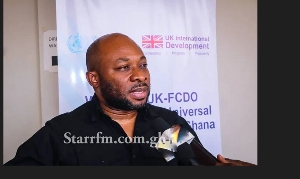Health News of Wednesday, 28 February 2024
Source: starrfm.com.gh
Research advocates male presence in labour wards to combat postpartum depression among women
A recent study on Postpartum Depression (PPD) among Ghanaian women has shed light on key recommendations aimed at addressing alarming rates of maternal mental health issues in the country.
The research underscored the importance of allowing spouses to accompany women in labour wards and theatres, providing crucial support during childbirth to alleviate fear and anxiety.
“Allowing spouses in the theatre and wards will help ease patients’ fear and anxiety, offer encouragement,” the research recommended.
Additionally, the study recommends the establishment of “daddy’s clinics” by the Ghana Health Service, aimed at promoting the active involvement of spouses in the pregnancy journey.
These clinics would serve as platforms for partners to gain insight into the nuances of pregnancy, offering emotional and physical support to expectant mothers.
Findings from the Mental Health Situational Analysis in Ghana revealed a PPD prevalence of 27% among women who delivered at primary, secondary, and tertiary healthcare facilities, with a staggering 50.1% recorded in Bawku.
The research also spotlighted the economic and human costs associated with maternal mental health disorders, including increased risk of maternal morbidity and mortality, stunted growth in children, and social and cognitive impairment.
Dr Promise Sefogah, a leading consultant for the World Health Organization (WHO) on maternal mental health, attributed the triggers of PPD among Ghanaian women to various factors such as financial constraints, fear of medical procedures, and traumatic birth experiences of themselves and others.
Despite the severity of the problem, Dr Sefogah emphasized the lack of knowledge and training among healthcare workers, coupled with inadequate screening and counselling services at health facilities.
This he said pushes the affected women to spiritual and herbal centres to seek a solution which worsens their plight.
These were revealed during a dissemination meeting for the Maternal Mental Health Situational Analysis in Ghana – Southern Zone, hosted in Koforidua.
In response to these challenges, advocacy efforts have intensified for the development of a Maternal Mental Health Policy, aimed at integrating mental health services into existing healthcare frameworks.
Dr. Winfred Ofosu, the Eastern Regional Director of Health, highlighted the urgency for a National Policy Framework on Maternal Mental Health Care, stating the need for comprehensive strategies to combat maternal mental disorders.
Dr. Ofosu revealed plans to implement an action plan at regional and district levels to address the identified challenges while awaiting the national policy framework.
The initiative, sponsored by the World Health Organization Ghana and UK International Development, aims to curb maternal mental disorders in Ghana.
Dr. Joana Ansong, Technical Officer for non-communicable disease and Mental Health at WHO Ghana country office, stated that Maternal Mental health issues have been relegated to the background for far too long in Ghana therefore the time to act now for a policy intervention to be integrated into the routine perinatal services in various levels of care tackle the burden of maternal health holistically.











